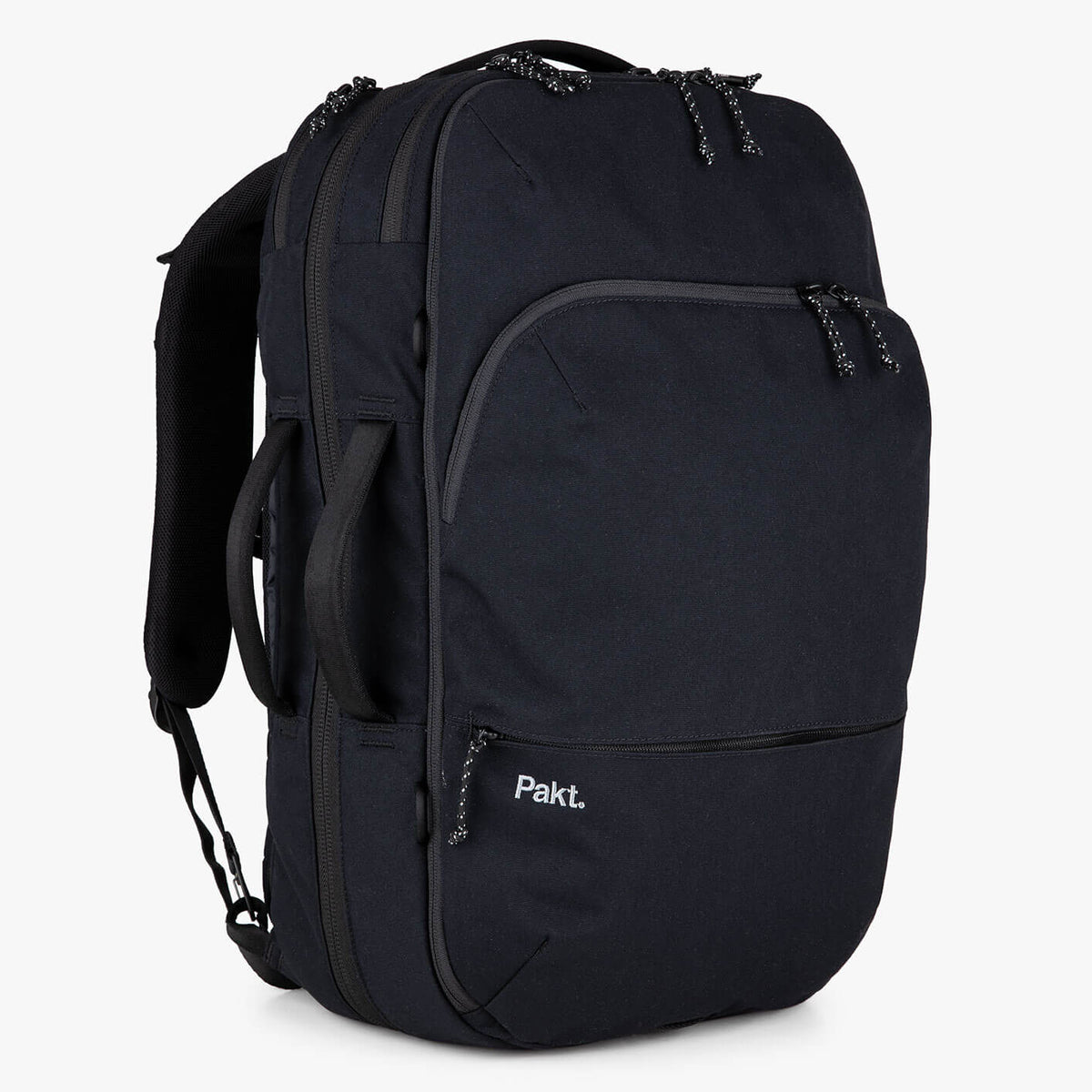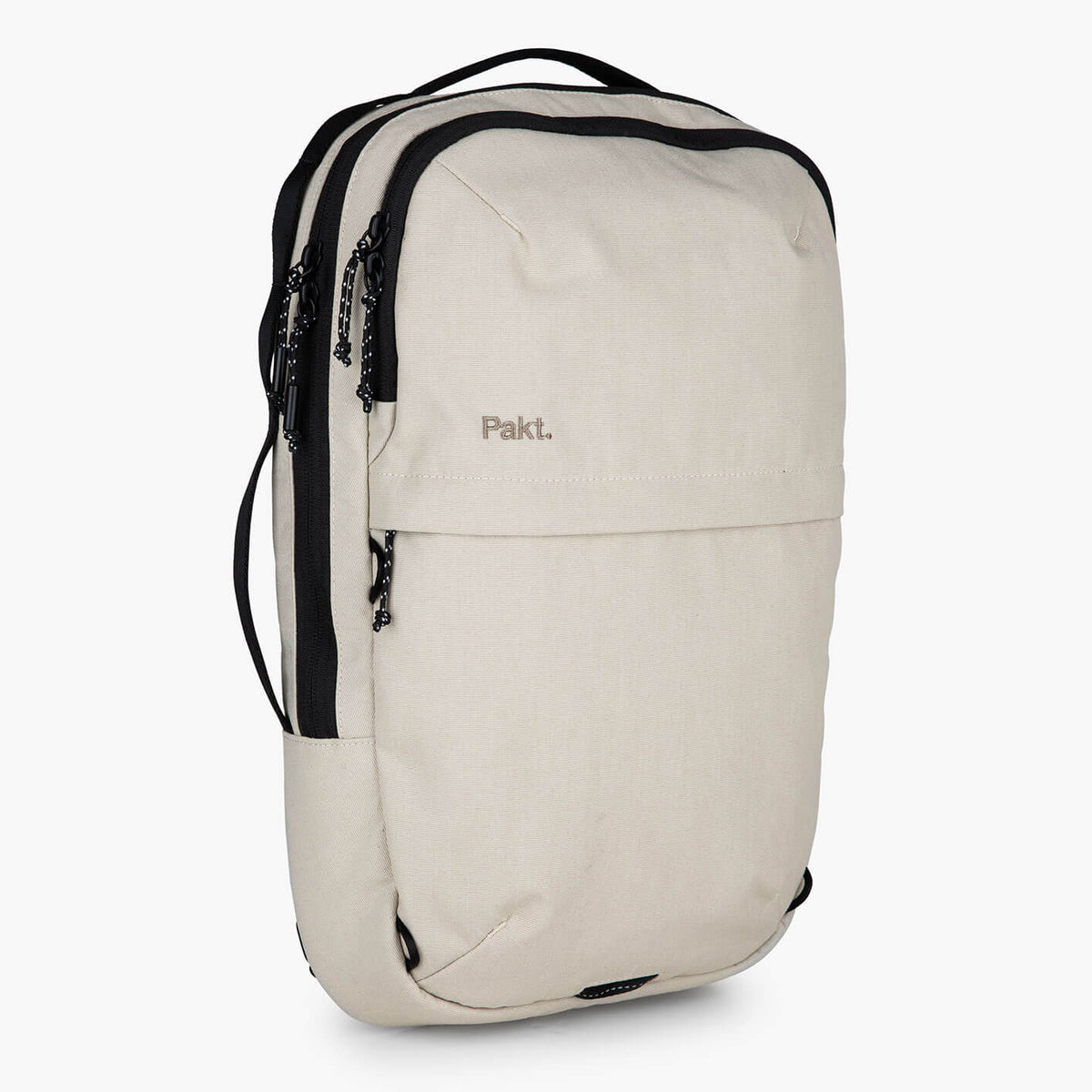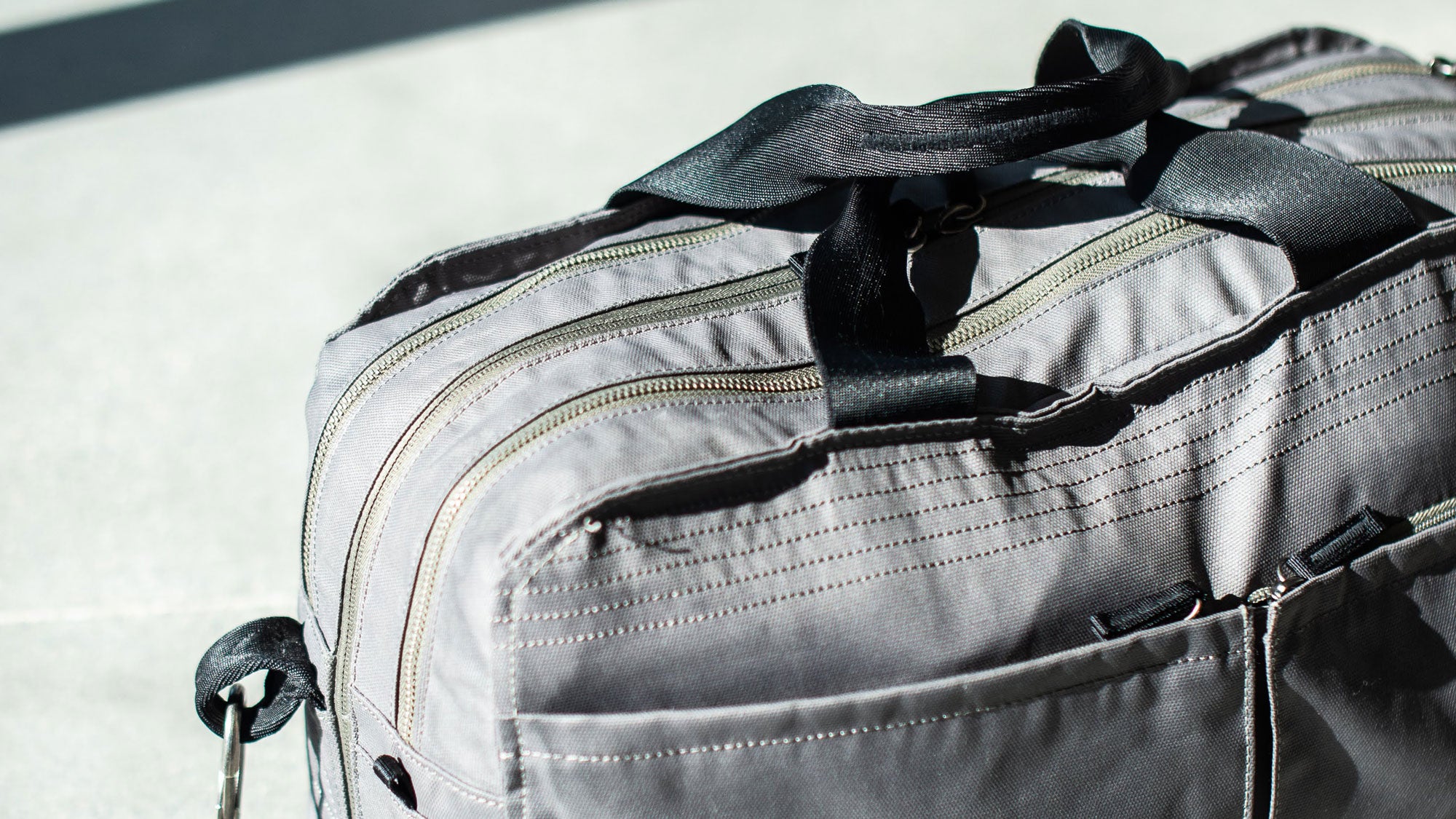Carry On vs Checked Bag: Pros, Cons & How to Choose
It’s every traveler’s greatest dilemma: Should you carry on or check your bag? The length of your trip will likely be a contributing factor, but there’s a lot more to consider here.
For some, the decision comes down to the expense of baggage fees. Others value the freedom of traveling light, but many want the space to bring everything they might need or want, just in case.
For those who don’t firmly fall into Team Carry-on Bag or Team Checked Luggage, we’ve created this guide to the pros and cons of traveling with a carry-on vs checked bag to help you decide which option is best for your next adventure.
Carry-On vs Checked Bag: What’s the Difference?
If you’re new to airline travel, you might be wondering what the differences are between checked luggage and carry-on luggage. Here’s what you need to know to make an informed decision about which one is right for you.
- Carry-on luggage: Carry-on luggage is the luggage you take on the plane with you. You are generally only allowed one carry-on, and it must fit in the overhead bin above your seat. Some airlines also allow you to carry on a smaller personal item, such as your purse, The 25L Anywhere Duffel, or The Anywhere 5L Sling, which must be small enough to fit under the seat in front of you.
- Checked luggage: Any luggage that is stored in the cargo area underneath the plane is called checked luggage. Checked bags are given to the attendant when you check in for your flight before you go through airport security. Many airlines charge a fee for checked bags, but they often allow you to bring more than one.
Size
Size is one of the biggest differences between carry-on vs checked luggage. The requirements can vary from airline to airline but in general a carry-on measures 22x14x9 inches. Pakt’s Travel Backpack and The Pakt One travel duffel are both designed to meet carry-on size requirements for most major airlines.
A checked back can measure up to 62 linear inches or smaller. The Anywhere 50L Duffel/Backpack Hybrid is a great example of a checked bag that will accommodate everything you need for longer trips but also work as a carry-on for those times when you want to travel light.
Weight
Weight restrictions can vary from airline to airline, as well. Many airlines don’t weigh carry-on bags as long as they meet size requirements. However, budget airlines are more likely to put a weight limit on carry-on luggage, so be sure to ask when you book your flight. The standard weight limit for a checked suitcase is usually around 50 pounds.
Packing Restrictions
It’s important to know the packing restrictions for carry-on vs checked luggage. For example, lithium batteries can only go in your carry-on luggage while certain sports equipment must be checked in. Other items, such as toiletries, are limited to a certain amount in carry-on luggage but have no limits when checked in.
You’ll find the full list of what you can bring in your carry-on vs checked bag right here.
Fees
Whether or not you’ll be charged a fee for your carry-on or checked bag varies by airline and the type of ticket you purchase. Budget airlines may charge a fee for all baggage, while others only charge extra for economy class fares. You can also incur extra fees if your luggage is overweight or if you bring multiple bags.
Storage Capacity
Storage capacity can be quite different between a carry-on bag and a checked suitcase. However, a strategic packer can fit everything in a carry-on, which is ideal when you want to travel light or want a smoother airport experience. Checked luggage might be a better fit if you need more space or for long trips when you’ll be settled in just one place.

The Pros of Choosing a Carry-On Bag
The ease of traveling from place to place with just one bag that never leaves your side. The freedom to go wherever the road or trail takes you without the inconvenience -and weight- of a checked back holding you back. Those are the main advantages of traveling with just a carry-on!
But there’s more to it than that, so let’s explore the pros of choosing a carry-on in more detail.
Ease of Movement
Will you be on the go from place to place or changing accommodations frequently on your trip? What about navigating crowded city streets… or trekking on a backcountry trail? That’s not going to be an issue if you’re traveling with a carry-on backpack or duffel!
A carry-on bag is lightweight, easy to pack, and can handle just about any type of terrain or urban destination with ease. On the other hand, dragging a heaving rolling suitcase up stairs or through crowded cobblestone streets is not only inconvenient, but it’s also a real pain in the back!
Easier Packing and Organization
Carry-on-sized travel bags are designed to make packing and organization easy. They often come with clever features like wrap-around zippers and clamshell openings so you can pack your carry-on just like a suitcase.
Thoughtfully designed carry-ons include multiple compartments, padded laptop sleeves, and specialized pockets for things like travel documents and toiletries. Not only is packing easier because you’re bringing less, everything you need is right at your fingertips and easy to find!
Less Stress
We’ve all heard horror stories about checked bags and how they can end up lost or on the wrong plane. With a carry-on bag, you never have to wonder if your bag is on the right plane. It’s a sure thing because it’s always with you.
No Waiting at the Baggage Claim
If you’re arriving in a foreign country with only a carry-on bag, all you have to do is clear customs and you’re out the door. And if you’re traveling domestically, you could be walking out of the terminal and enjoying your destination in minutes. Waiting at the baggage claim can take hours, especially at peak travel times.
The Cons Of Choosing a Carry On
Ultralight travel with just a carry-on has some major advantages, but there are some cons to consider as well. Here are some things to think about, based on your destination and travel style.
- Limited Space: If you’re the type that likes to have a special outfit and shoes for every occasion, a carry-on may not be for you. Space could also be an issue if you travel with multiple bulky items, such as winter garments, sports equipment, or camera gear. You may also have to limit the number of souvenirs you buy, or be willing to ship them home via mail.
- You Might Have to Do Laundry: With only a carry-on, your wardrobe will be somewhat limited, so you’ll probably have to do some laundry on longer trips. That being said, laundromats aren’t that hard to find and hand washing is always an option for many items.
- Carry-Ons Aren’t Always Free: Unfortunately, some airlines charge a fee for checked luggage and carry-on luggage. This is especially common with budget or discount airlines, so be sure to do your research to see what you can bring for free and what you’ll have to pay extra for.

The Pros of Choosing a Checked Bag
With all of that in mind, let’s talk about the pros of choosing a checked bag over a carry-on.
Low-Stress Check In
If the check-in agent decides your carry-on is too heavy or too big to fit in the overhead compartment, you’ll have no choice but to check it in anyway. So, if you’re likely to stuff your bag to the brim, planning to check your bag might be the lower-stress option.
Space to Pack What You Want
Obviously, you don’t have to stuff your checked bag to the seams, but having the space to pack as much as you want is an advantage for some people. You can bring all the winter clothes and extra gear and still have room for some souvenirs.
Checking Your Bag Might Be Easier
If you have physical limitations, navigating the airport with a carry-on bag might be a challenge. The same goes for families traveling with young kids. If you’re already carrying a baby and a car seat, having to carry your bag everywhere you go might not be worth the hassle.
Checking your luggage can make things easier, whether you’re being escorted by wheelchair, carrying an infant, or dealing with a bad back. And, if you’re already checking bulky items like a stroller or walker, you won’t be saving any time by carrying on your luggage.
The Cons of Choosing a Checked Bag
So, what are the cons of choosing to check your luggage? Here’s what you need to know:
How to Choose Between Checked Baggage vs Carry On
The decision to go with checked baggage vs carry-on baggage is a personal one and often varies from trip to trip.
In general, if you enjoy minimalist travel, you like the convenience of avoiding the baggage claim, or you want to avoid checked bag fees, go with a carry-on. But if you feel you really need the extra space or the thought of carrying your luggage everywhere you go is just too much, a checked bag is probably the better option.
If you still can’t decide which one is the better choice for you, ask yourself the following questions:
1. Will you be participating in a variety of activities that require special equipment? Can you rent the equipment you need when you get there, or do you need to bring it all with you?
2. Do you like to bring extra items with you, just in case you need them? Or do you feel freer when you have fewer items to carry around?
3. If you pack light, will you end up spending more money to purchase items along the way? Or, can you pack light and get by with what you bring?
4. Are you ok with carrying your bag with you everywhere, even during long layovers at the airport? Or would you rather check your bag to avoid the hassle of carrying it around?
Times to Choose a Carry-On
You’re traveling somewhere warm
The lighter your clothing requirements, the less space you’ll need for your wardrobe.
You’ll be moving around a lot
If you’ll be packing up and moving from destination to destination, traveling light with just a backpack or duffel will be much more convenient and easier overall.
When Checked Luggage Might Be a Better Option
Traveling through multiple climates
If you’ll be traveling through both hot and cold climates, checked luggage will allow you to pack your cold weather gear and your beach attire in one bag. Although you could wear your bulkiest clothes through the airport, this could get uncomfortable, especially if you're flying when it’s hot.
You travel with a lot of bulky equipment or gear
While you probably wouldn’t want to check your laptop or an expensive camera, if you’re carrying multiple lenses, tripods, and a drone, you’re probably going to need more space.
The same goes for those who travel with specialized equipment for some kind of sport or activity. The Pakt Gear Hauler converts from a massive 120L zippered tote to a 60L open carry crate. It’s the ideal checked bag for everything from camping gear to sporting goods and other hard to pack gear that you can’t carry onto the plane.
Checked vs Carry-On: Which One is Better?
Carry-on bags are ideal for minimalist travelers who like to move from destination to destination. They’re a great choice for shorter trips, budget travelers, and even longer trips if you’re a strategic packer who doesn’t mind doing laundry when you travel.
Checked luggage is the best choice for someone who needs or wants more space, but is generally more expensive, more difficult to carry from destination to destination, and less versatile overall. However, checking your bag has its merits, especially if you’re traveling with young children or have physical disabilities.
Only you can decide which type of bag suits you best. Explore Pakt’s collection of classic travel bags to find the perfect bag for your next adventure!




